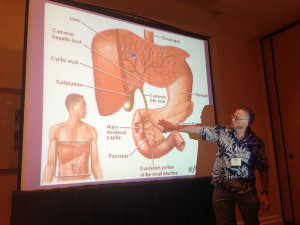Surveillance Testing
Colonoscopy
Endometrial Sampling
Annually, beginning between ages 30-35
NCCN Guidelines reflect despite no current scientific evidence, annual endometrial samplings may be useful in select patients. (NCCN Version 2/2011)
Transvaginal Ultrasound
For Endometrial and Ovarian Cancer: Annually beginning ages 30-35 NCCN guidelines determine this is at the clinician’s discretion.
CA-125
For Ovarian Cancer. While there may be times screening can be helpful, NCCN has determined data does not support routine ovarian screening for LS. (NCCN Version 2/2011)
Ultrasonography with Cytology
Annually, beginning at age 25-35 (NCCN Guidelines, Version 2.2011 refer to an “annual urinalysis.”)
Gastroscopy
Especially for individuals with family history of Lynch gastric cancers. NCCN guidelines recommends for consideration of gastric and small bowel cancer screening, an EGD with extended duodenoscopy (to distal duodenum or into the jejunum) and polypectomy every 2-3 years beginning at the age of 30-35.
Other Screenings
may be considered including baseline gastric biopsies to evaluate chronic inflammation, atrophic gastropathy, and intestinal metaplasia and consider shorter screening intervals in persons with normal histology. Evaluate for H. Pylori on the biopsies and by serology and treat those with evidence of infection. Consider enteroscopy at the time of the EGD to evaluate the distal duodenum and jejunum.
Consider Capsule endoscopy
for small bowel cancer at 2-3 year intervals beginning at age 30-35.
Exam and Review
Family History Review, Discussion of LS – Annually
Colon Resection
For individuals with active colon cancer that cannot be removed by colonoscopy. Subtotal colectomy favored with preferences of patient actively elicited. The National Comprehensive Cancer Center Guidelines recommend a total abdominal colectomy with ileorectal anastomosis in the event of adenomas not amenable to endoscopic rescection. (NCCN Guidelines Version 2.2011)
Hysterectomy and/or Oophrectomy
Discuss as an option after childbearing years to deter the high risk of gynecological cancers.
Dermatologic Exam
For Muir-Torre (lesions of the skin including sebaceous adenomas, sebaceous epitheliomas, basal cell epithelioma with sebaceous differentiation, sebaceous carcinoma and squamous cell cancer (keratoacanthoma type.)
Other Tests
may be ordered at the discretion of the Clinician to include screenings for pancreatic cancer, CNS cancer, prostate cancer, liver cancer, gallbladder cancer and renal-pelvic cancer. Screening testing for H Pylori is often done. H Pylori is a bacterium which can enter the stomach lining. It triggers a release of cytokines which begin creating havoc by activating fibroblasts which rebuild infected tissue. The high concentration of reactive gasses released by the inflamed cells create mutations in the cell’s DNA. The continued division of these cells creates cancer. Discuss with your gastroenterologist H Pylori bacterium and your risk.
 The National Comprehensive Cancer Network sets guidelines for management of colorectal cancers and cancer syndromes. Access is free, however one must register. To locate the guidelines for Lynch syndrome, click under NCCN Guidelines for Detection, Prevention and Risk Reduction and then click on Colorectal Cancer Screening. These standards are pretty much a minimum standard of screening. There is an entire section on Lynch syndrome. Mentioned above is a “gold standard”, utilized by many physicians to minimize risk for the various cancers of Lynch syndrome.
The National Comprehensive Cancer Network sets guidelines for management of colorectal cancers and cancer syndromes. Access is free, however one must register. To locate the guidelines for Lynch syndrome, click under NCCN Guidelines for Detection, Prevention and Risk Reduction and then click on Colorectal Cancer Screening. These standards are pretty much a minimum standard of screening. There is an entire section on Lynch syndrome. Mentioned above is a “gold standard”, utilized by many physicians to minimize risk for the various cancers of Lynch syndrome.
It cannot be emphasized enough how very important annual surveillance is for those who are at high risk for Lynch cancers. Within the colon, the tumors of Lynch syndrome are often very small and flat, therefore, difficult for some gastroenterologists to view. Due to this small size, they can also become hidden within the folds of the colon. These tumors are extremely aggressive and it is not unusual to hear survivor stories of cancers growing and metastasizing earlier than two years, compared to the average dwell time of sporadic cancers which quite often take longer than five years.
Studies have revealed those with Lynch cancers experience a higher rate of survival than those with sporadic cancers. It is believed this may be due to the frequent surveillance testing and the detection of cancers before they become life threatening. Therefore, don’t miss those annual examinations and if your physician attempts to talk you into examinations less frequently, stand firm in insisting on being monitored annually as several recent studies have indicated is the best professional practice.

